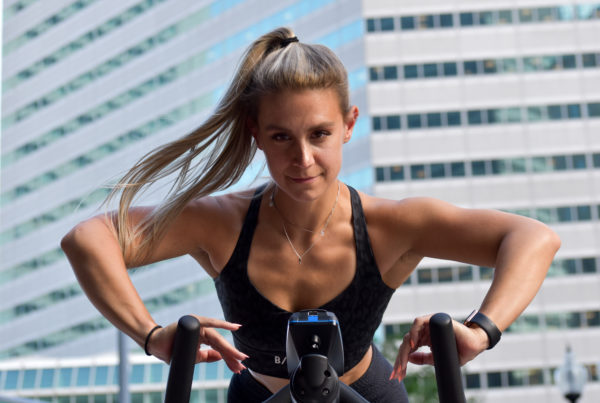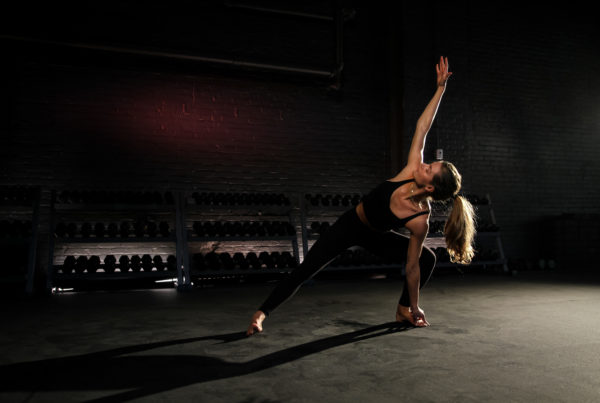We’re big fans of eastern healing at B/SPOKE. From our favorite herbal teas to spices we put in our smoothies, there’s nothing some good, solid mind and body work can’t do for the soul. Enter: Anastasia Hall, MS, L.Ac, whose eastern methods have helped many B/SPOKE instructors and riders.
Walking into Anastasia’s office in Boston’s Back Bay is the first step to state of calm. Overlooking Copley Square, her office is a quiet retreat from the hustle and bustle of Boston’s busy streets. Step inside and get ready to enter a state of total zen.
“I get acupuncture every other week as a base and then add massage and more Acupuncture as needed,” Anastasia told us. “Having a regular acupuncture session on the books helps to stay balanced and not let anything build up too much.”
Anastasia works with the intent of healing. So whether you’re using acupuncture to recover from an injury, managing stress or anxiety, or just seeking a little serenity, there’s little her needles can’t do. We caught up with Anastasia before one of our sessions and got some tips from her for first-time visitors, as well as ways of keeping the effects of acupuncture going long after your one-hour session.
How do you view acupuncture as part of healthy routine?
Acupuncture helps us to reintegrate our body and mind connection and has two modes of treatment: acute and preventative.
Acute: Something hurts right now and may have come from a recent injury or overdoing it in your workout or play. Acute issues benefit from immediate treatment and quick follow ups to eradicate the issue before it settles in and makes a permanent home in your body. I am a big fan of preventing future drama from injuries.
Chronic/Preventative: Some part hurts all the time either due to a serious injury or overtraining, or due to an element of life that repeatedly breaks you down. This can be a long period at a desk working and giving rise to a tight back or fatigue.Chronic treatments are about getting you out of the pattern you are in. This can take a little longer to solve.
The preventative aspect is about keeping the body and mind running smoothly, neutralizing issues as they begin, and preventing depletion by keeping the immune and digestive systems in balance as well as draining stress before it can become toxic.
What are some tips for first-timers to acupuncture?
Ask questions! Work with someone who makes you feel comfortable. This is a therapeutic relationship. It shouldn’t be hard to make yourself heard. Just be honest about what you are worried about or pained by, the problem solving work is done by analyzing your input.
If you are afraid of needles, it’s totally okay. Acupuncturists do a lot more than just wield needles. I’m happy to draw on other techniques (cupping, moxa, topical herbals, essential oils) especially when I see that a client is concerned. That said, the needles are so tiny! With every new technique, we discuss what to expect and work within your comfort zone.
Lastly, wear loose clothing.
What do you suggest people do before their first session?
It’s helpful to make a note of the issues that have led you to Acupuncture. Often in the moment we forget a key issue and miss out on addressing it in the first session. Bring a list of medication, supplements and any drugs you take and if you have had an MRI of the area you would like treated, bring the report.
On the day of your appointment, don’t plan much for after your session. You will feel a little “intoxicated” and possibly sleepy. After your first few experiences, you will have a gauge of how you typically feel and what you will be up for afterwards. Initially, plan to go home, lay on the couch and enjoy the feeling.
What are the results one can expect from their first acupuncture session?
Acupuncture makes it seem less daunting to be a human. It eases our pain and allows us to imagine a better solution to the problems we face. When I have a problem I need to solve, getting an Acupuncture treatment is high on my list. Often the answer just comes to me after all the chaos is swept away.
You can expect to experience everything from increased range of motion to ease in digestion, sleep, focus, attention, retention, motivation.
You may notice you need fewer doses of ibuprofen, fewer drinks to relax, fewer episodes of road rage. This leads to less frustration and more happiness.
What are your 5 essentials for healthy living?
Laughter: My home is a place of giggles, goofing around and downright laughing out loud. This is a major aspect of keeping sane and well for my family. We tell stories, jokes and make a lot of silly faces because we are funny people and life is harder when it’s too quiet.
Oils and Healthy Fats: Brain cells (neurons) are mostly fat. A thriving nervous system requires oils and healthy fats. Coconut oil, Avocados, small amounts of animal fats-mainly from my homemade bone stock, grass fed butter, olive oil, hemp oil and sesame oils all play a part in nourishing the nervous system. The nervous system is often where we can aim our self healing for the biggest results.
Gratitude/Spirituality/Self-Acceptance: I try to operate on the assumption that the Universe is genuinely interested in me and my shenanigans. I try to keep an eye out for divine mischief. In the spirit of this, I invite myself to accept wherever I am, loving what society may judge as not enough, and breathing into that peace. It helps that I am a bit unconventional and have a sturdy sense of humor.
Tea! I make a lot of tea. I love coffee but tea is a toolbox full of impact.



